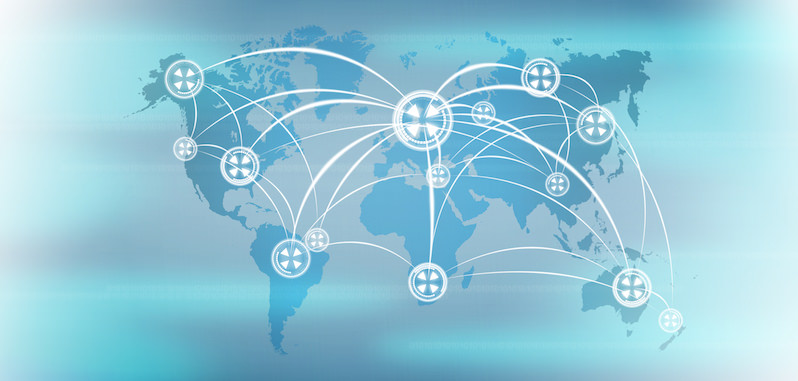Net Neutrality on the Line
The net neutrality discussion has recently been reinvigorated on the national level. That's great news for organizations that have been pushing for that exact course of action here in the U.S., but how does it affect the conversation on a global level? Shutterstock
Shutterstock
The net neutrality discussion has recently been reinvigorated on the national level, since President Obama came out in support of online freedom and recommended we reclassify the Internet under Title II of the Telecommunications Act. That’s great news for organizations that have been pushing for that exact course of action here in the U.S., but how does it affect the conversation on a global level?
Whether or not it is warranted, much of the world still views America as an example. “On a variety of domestic and international issues, from trade to environmental regulation to whatever, the U.S. is often looked to as setting a global standard,” Josh Tabish, campaigns manager at the Internet protection organization OpenMedia, told Truthdig. “Right now, the European Union is negotiating net neutrality rules,” he noted. “The big question is: Will the bill survive the [human rights organization] Council of Europe such that really good, really strong and really positive net neutrality provisions become law?”
The EU proposal has already passed parliament, but it still needs to get through the Council of Europe. Tabish believes Obama’s words in support of strong net neutrality laws could help tip the scale. Susan Crawford, a Cardozo School of Law professor who specializes in tech policy, told Truthdig via email that Obama’s statements will have a “big effect” in the EU.
According to Tabish, “The European Union and the United States are both racing toward net neutrality rules, and the outcome of that decision could affect 800 million Internet users around the world.” He and his OpenMedia colleagues have seen violations of net neutrality in their home country of Canada. As one example, he pointed to a labor dispute between Canadian Internet provider Telus and its employees, in which the service provider blocked its subscribers from visiting a website meant to organize the union members who were on strike.
But net neutrality is an issue with stakes that impact other zones beyond Europe and North America. In what Tabish described as a “particularly evil form of net neutrality violation,” companies such as Google and Facebook have set up agreements in places such as South America and Africa with a practice called “zero-rating” that allows people connected to certain Internet providers to access their service for free. Google and Facebook provide these services under the names Facebook Zero and Google Free Zone.
“These deals give people free access to text-only versions of things like Facebook news feeds, Gmail and the first page of search results under plans like Facebook Zero or Google Free Zone. Only when users click links in emails or news feeds, go beyond the first page of search results, or visit websites by other means do they incur data charges,” David Talbot wrote in MIT Technology Review in January.
The problem with this type of phenomenon, Tabish asserted, is that it limits the kind of Internet access people in developing countries can get. Essentially, major Internet corporations are able to exert complete control over what people see and use online. “Big companies will pay telecom companies in developing nations to have their services be the only one that’s made available,” he said.
Net neutrality is also being closely considered in countries such as Iceland, Argentina, Colombia and Uruguay. These nations will impact the future of their economies with their decisions. “Lack of net neutrality in other countries creates conditions where local digital economies cannot thrive,” Tabish said. Without safeguards on net neutrality, countries are less likely to innovate in a world where the Internet is a major factor in creating and accessing new goods and services.
Finally, variations in net neutrality standards among countries could seriously affect how the Internet functions internationally. A message sent from New York to Seattle may seem to constitute a communication between two people in the same country, but currently some Internet Service Providers bounce signals across country borders without restriction; that message might cross over to Brazil or Canada en route to its final destination. If a signal bounces into a country where the Internet is throttled by certain constraints, it could affect how efficiently the system works overall. “Experts do not have a clear sense of what that relationship will look like,” Tabish said.
“At the end of the day, losing net neutrality would mean giving Internet Service Providers, which are some of the most powerful companies in the world and some of the most profitable, the legal tools they need to squeeze every single dollar out of every single website and every single user on the Internet,” Tabish said. Our president may have come out in favor of net neutrality, but it is in the hands of the FCC to decide whether America truly sets the right example for the world to follow and whether the Internet continues to exist as it has.
Your support matters…Independent journalism is under threat and overshadowed by heavily funded mainstream media.
You can help level the playing field. Become a member.
Your tax-deductible contribution keeps us digging beneath the headlines to give you thought-provoking, investigative reporting and analysis that unearths what's really happening- without compromise.
Give today to support our courageous, independent journalists.

You need to be a supporter to comment.
There are currently no responses to this article.
Be the first to respond.